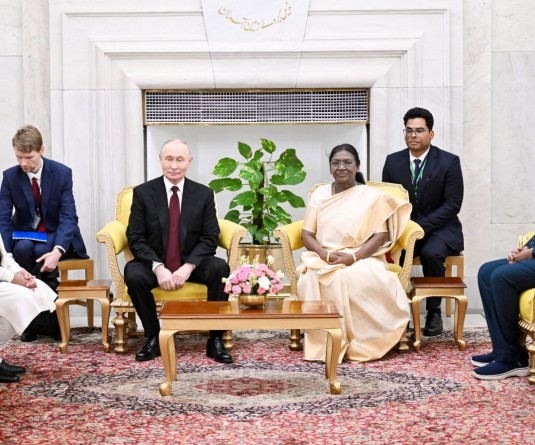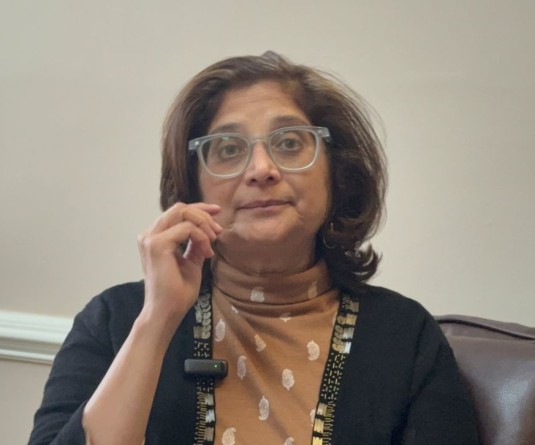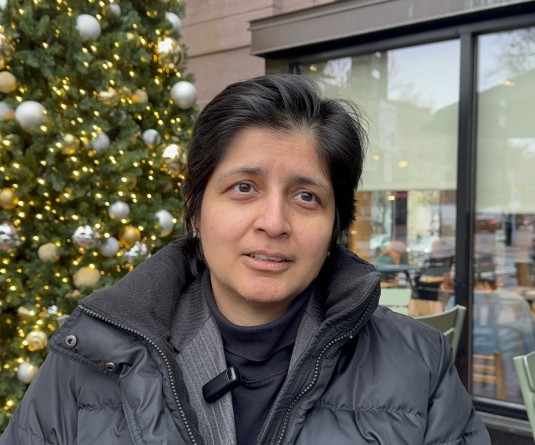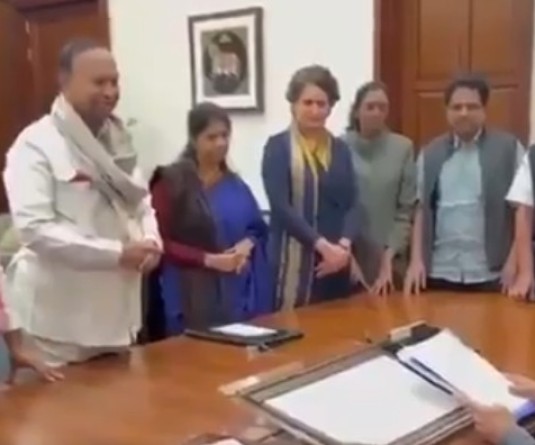Chattogram: Bangladeshi Hindu community protest against violence targeting the country’s minorities in Chattogram on Monday, August 12, 2024.(IANS)
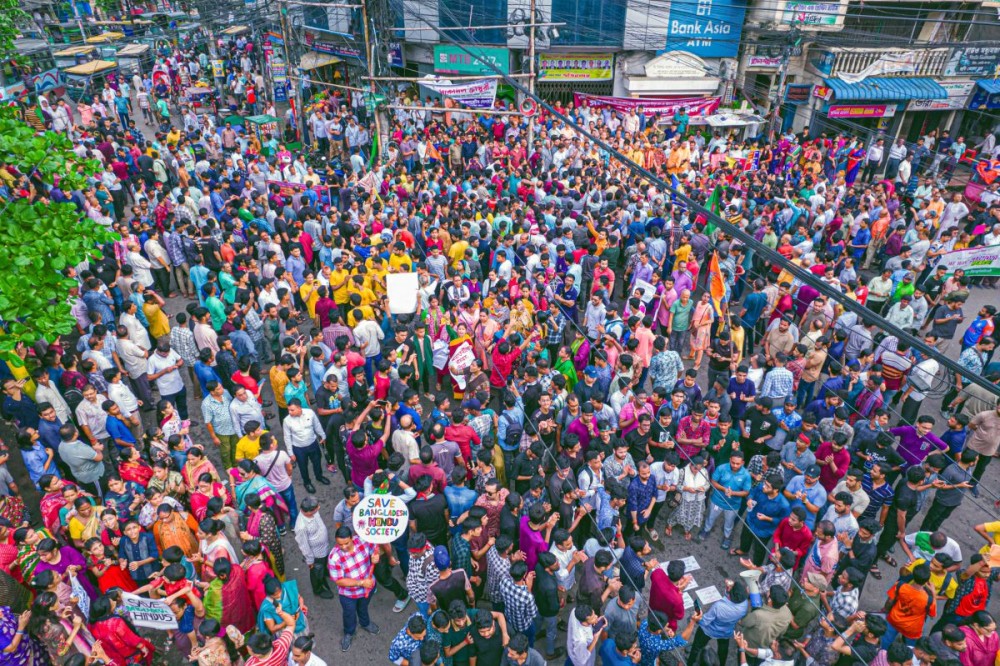
New Delhi, October 8 (IANS) The 2024 July Uprising, showcased as youth fighting against injustice and apparent authoritarian governance of Sheikh Hasina shattered rose glasses soon after the interim government was established on August 8, 2024 with Muhammad Yunus as its chief advisor.
It is all too very clear now that the uprising was a well-knit plan by anti-Hasina forces who planted the seed of regime fall. The compromised law and order situation that followed since August 5 last year, along with steep rise in mob justice, rape and other gruesome offences, all seem to follow a simple pattern --purging the dissenters or opponents of the present interim government.
A year since Bangladesh’s ‘new’ democracy and nothing seem to change. Those who declared the previous government as ‘fascist’ are showing visible signs of what they claim to fight against. Now with tables turned, the democracy ‘restored’ has no place for opposition.
Who are the enemies of new Bangladesh? First comes the man behind Liberation War -- Sheikh Mujibur Rahman, popularly known as Bangabandhu or Jatir Pita.
The disturbing visuals of desecration of murals of Sheikh Mujibur Rahman all over Bangladesh were not mere cases of mob violence, but first signs of attack on liberation war principles.
The interim government, instead of condemning this, followed suit and undertook efforts to revise the legacy of Sheikh Mujibur Rahman -- from cancelling national holidays dedicated to him, removing his image from new currency notes, renaming government institutions dedicated to him to retracting Mujib’s title as “Father of the Nation”.
Moreover, Bangladesh supreme court revoked the country’s national slogan “Joy Bangla”. Now public expression of this liberation slogan or Sheikh Mujibur Rahman’s name draws police arrests and intimidation.
Through revision of textbooks, new Bangladesh under the interim government has attempted historical revisionism, to cater to Awami League’s political opposition, downplaying League’s role in Liberation War and that of Sheikh Mujibur Rahman himself.
One might wonder why Liberation War of 1971 and legacy of Sheikh Mujibur Rahman are re-appearing in popular and political discourse, especially among anti-Hasina forces.
These efforts are calculative steps to ostracise the Awami League, that has stood as the largest party of Bangladesh and played the most significant role of providing leadership to liberation fighters during the 1971 War.
The student wing of Awami League -- Bangladesh Chhatra League -- was first banned branded as a terrorist organisation last October, followed by complete ban on Awami League this May by amending the existing anti-terrorism law (2009).
Amid rampant mob violence Bangladesh witnessed the demolition of 32 Dhanmondi, Sheikh Mujibur Rahman’s private residence, under the call for ‘pilgrimage to the ‘fascist site’ “Bulldozer Procession” this February.
The vile act was justified by the interim government as a reaction to provocation by Sheikh Hasina, who is attempting to ‘destabilise’ the country from outside, a standard reply to dodge accountability on its efficiency in maintaining law and order. More vandalism followed on Mujib’s properties and mural across over 20 districts, along with properties of Awami leaders.
When a similar Bulldozer Program was attempted to carry out by a group to demolish the ancestral house of former liberation war affairs minister Mozammel Haque in Gazipur, skirmishes broke out as such attempts were thwarted. Instead of arresting the real culprits, who are obviously anti-League, the interim government launched a counterinsurgency and law enforcement campaign called the Operation Devil Hunt on 08 February.
By 20th of same month, the operation arrested as many as 18,384 people across Bangladesh, most affiliated with the Awami League and its auxiliary Chhatra League and Jubo League. Needless to say, the law enforcement campaign was just another tool of the interim government to crackdown on Awami League.
Not just Awami League, its political allies came under attack as well, although not directly by the interim government. Since last year, Jatiya Party (JaPa) headquarters were vandalised and set ablaze, escalating political tensions.
JaPa chief Golam Mohammad Quader was among the first to be publicly critical of the chief advisor and the interim government on its handling of the country’s law and order, making NCP as the King’s party and even questioning the interim government’s legitimacy and ability to hold free and fair election.
In August, more attacks on JaPa followed, on separate occasions by members of Gono Odhikar Parishad and Islami Andolan, that became extremely violent.
All Islamic parties, NCP, Gono Odhikar Parishad have been putting mounting pressure on the interim government to declare a ban on JaPa as well, like Awami League.
Taking inspiration from NCP-led procession in May that led for Awami League’s ban, Islamic parties, too, had taken to the streets recently with range of demands, including ban on JaPa and former alliances of the Awami League. However, the interim government has not taken any official position on it, but one can predict a similar move in the near future if the push for ban intensifies.
In August, the interim government also unveiled July Declaration, a political statement recognising the past as well as the ‘unfulfilled aspirations’ that emerged during the July Uprising.
However, the text of the declaration, a 28-point framework, was more a blueprint, a fatwa to repudiate the Awami League’s role since Bangladesh’s independence, and the weakness of the 1972 Constitution, which failed to materialise the aspirations of the Bangladeshi people. The declaration, besides being a one-dimensional criticism of the Awami League also mentions the interim government and Yunus’ leadership, notwithstanding its unconstitutional nature, to legitimise its existence.
With Awami League and its former allies gone, and national polls likely to be held in February next year, the election is between political parties—old and new—who all maintain cordiality with the interim government, especially with the chief advisor.
However, public opinion poll gives an interesting picture—the continued support for Awami League, despite its ban. The recently released People’s Election Pulse Survey (PEPS) reflected that 41.3 per cent favours BNP, 30.3 per cent favours Jamaat and 18.8 per cent favours the Awami League. Moreover, on the question of whether Awami League should be allowed to return to ballot, 45.79 per cent of respondents favoured an inclusive election, with League contesting, while 45.58 per cent wanted the Awami League to be barred from contesting election. Awami League’s popularity remains among older age brackets, who have witnessed the Liberation War.
This raises the question if Awami League should be excluded from contesting election, or face the mandate of people, whatever it may be. From the looks of it, the interim government would not want Awami League to contest as it may shatter the myth of League’s unpopularity as a ‘fascist’ that Yunus and its compatriots have painted so well.
So, taking help of law enforcement forces, the interim government is engaging in yet another witch hunting of Awami League followers and activists, despite a year after the July Uprising.
The recent arrest of 244 leaders for organising flash processions across the country only reveals the bitter truth—that Awami League continues to enjoy the confidence of its loyalists. While the new Bangladesh will face a democratic transition in less than five months—the democracy will be without an opposition.


